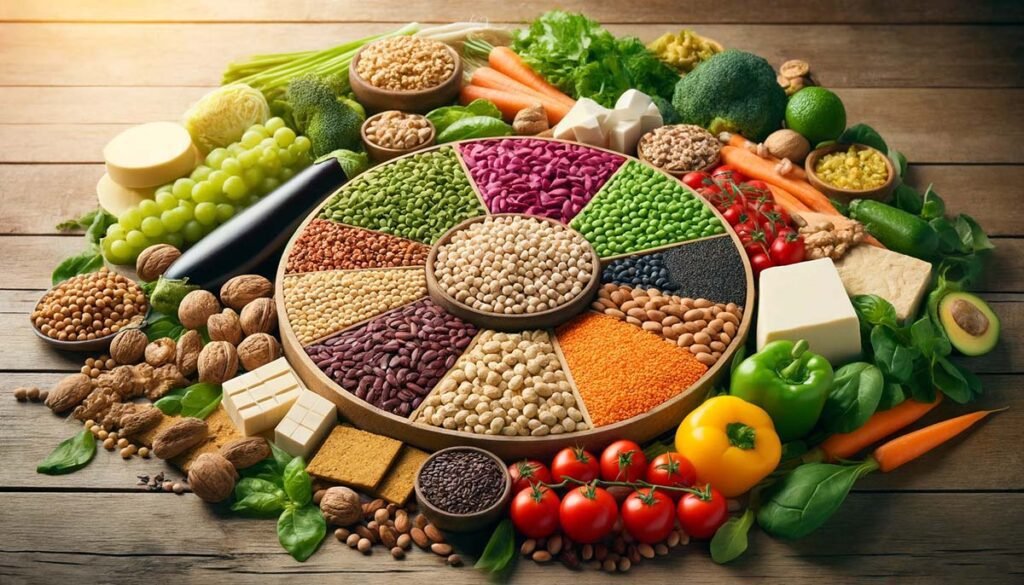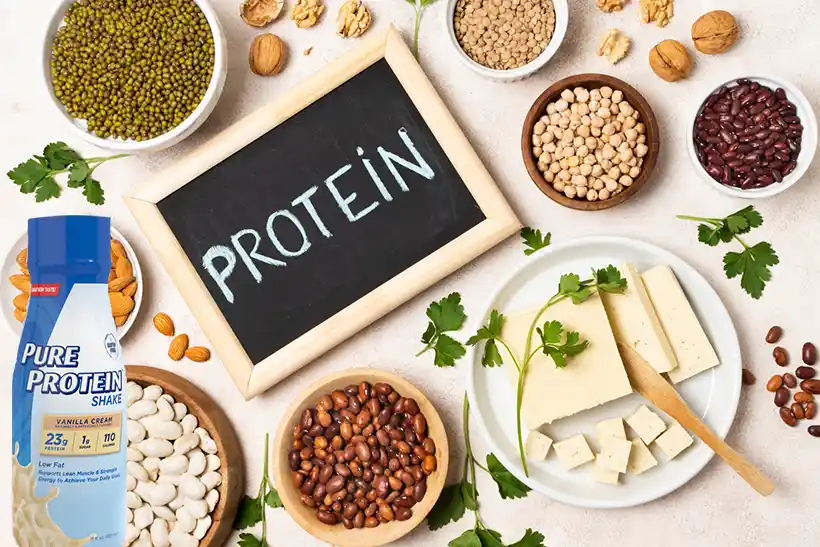In today’s health-conscious world, vegetarian diets are gaining popularity for their potential benefits for both individuals and the environment. Whether you’re a committed vegetarian or simply looking to incorporate more plant-based protein into your diet, understanding the variety of vegetarian protein sources is essential. Wellhealthorganic.com is dedicated to promoting holistic health through organic and natural solutions, making it an ideal resource for exploring vegetarian protein options. This comprehensive guide will delve into various vegetarian protein sources recommended by Wellhealthorganic.com, their nutritional benefits, and practical tips for integrating them into your diet.
Why Choose Vegetarian Protein Sources?
Vegetarian protein sources offer several health benefits, including:
- Heart Health: Plant-based proteins are often lower in saturated fats and cholesterol, which can support cardiovascular health.
- Digestive Health: Many vegetarian protein sources are rich in dietary fiber, promoting healthy digestion and regular bowel movements.
- Weight Management: Plant-based proteins can help maintain a healthy weight due to their lower calorie density and satiating effects.
- Environmental Sustainability: Choosing vegetarian protein sources can reduce the environmental impact associated with animal agriculture, such as greenhouse gas emissions and water usage.
Top Vegetarian Protein Sources Recommended by Wellhealthorganic.com
- Legumes:
- Lentils: Rich in protein, fiber, and essential nutrients like iron and folate.
- Chickpeas: Versatile legumes that can be used in salads, curries, and snacks, providing protein, fiber, and minerals.
- Black Beans: High in protein and fiber, with a hearty texture ideal for soups, stews, and Mexican-inspired dishes.
- Quinoa:
- A complete protein containing all essential amino acids, making it a valuable addition to vegetarian diets. Quinoa is also gluten-free and rich in fiber, magnesium, and antioxidants.
- Nuts and Seeds:
- Almonds: Nutrient-dense nuts rich in protein, healthy fats, vitamin E, and magnesium.
- Chia Seeds: Packed with protein, omega-3 fatty acids, fiber, and antioxidants, making them a superfood for vegetarian diets.
- Hemp Seeds: Excellent source of complete protein, omega-3 and omega-6 fatty acids, and minerals like iron and zinc.
- Tofu and Tempeh:
- Tofu: Made from soybeans, tofu is a versatile protein source that absorbs flavors well and can be used in stir-fries, soups, and smoothies.
- Tempeh: Fermented soybean product with a nutty flavor and firm texture, providing protein, probiotics, and B vitamins.
- Whole Grains:
- Brown Rice: Provides a moderate amount of protein along with fiber, vitamins, and minerals.
- Oats: Contains avenalin, a protein similar to legume proteins, as well as soluble fiber that supports heart health.
- Dairy Alternatives:
- Soy Milk: Fortified with calcium, vitamin D, and protein, making it a nutritious dairy alternative for vegetarians.
- Greek Yogurt (Non-dairy): Made from coconut or almond milk, offering probiotics and protein.
Tips for Incorporating Vegetarian Protein Sources into Your Diet
- Plan Balanced Meals: Include a variety of vegetarian protein sources in your meals to ensure you’re getting a complete range of essential amino acids.
- Experiment with Recipes: Explore new recipes and cooking methods to keep your meals interesting and flavorful.
- Combine Complementary Proteins: Pair incomplete protein sources (e.g., beans and rice) to create a complete protein meal.
- Snack Smart: Choose protein-rich snacks like nuts, seeds, or hummus with vegetables to satisfy hunger between meals.
- Read Labels: When selecting packaged vegetarian protein foods, check labels for added sugars, sodium, and artificial ingredients.
OVERVIEW OF VEGETARIAN PROTEIN SOURCES

A Diverse Array of Options
Vegetarian diets offer protein-rich foods that meet nutritional needs without relying on animal products. These diverse sources include legumes, nuts, grains, and soy-based products. Each category provides unique health benefits and can be incorporated into various culinary practices, ensuring nutritional adequacy and variety.
Key Categories of Vegetarian Proteins
- Legumes: Including beans, lentils, and chickpeas, these are rich in protein and fiber, supporting digestive health and satiety.
- Nuts and Seeds: Almonds, walnuts, chia seeds, and flaxseeds are excellent sources of protein and healthy fats.
- Grains: Quinoa is a complete protein, offering all nine essential amino acids.
- Soy Products: Tofu and tempeh are versatile and nutrient-dense options, popular in many vegetarian dishes.
- Dairy and Plant-Based Alternatives: For dairy consumers, products like Greek yogurt are protein-rich, while plant-based milk and protein powders offer convenient alternatives.
By exploring these categories, you can ensure a balanced and enjoyable vegetarian diet rich in protein and other essential nutrients.
LEGUMES – NUTRITIONAL POWERHOUSES
Legumes, a staple in many vegetarian and vegan diets, are among the most nutrient-dense foods available. This category includes beans, lentils, and chickpeas, all offering significant health benefits. These plant-based proteins are high in protein and rich in essential nutrients such as fiber, vitamins, and minerals.
Nutritional Profile of Legumes
Legumes are celebrated for their impressive protein content. For example, chickpeas provide about 19 grams of protein per 100 grams, while lentils offer approximately 18 grams per 100 grams. Depending on the variety, beans can range from 15 to 25 grams of protein per 100 grams. In addition to protein, legumes are high in dietary fiber, which supports digestive health and helps maintain a healthy weight by promoting a feeling of fullness.
Health Benefits of Legumes
Legumes’ high fiber content helps regulate blood sugar levels, making them an excellent choice for individuals with diabetes or those looking to manage their weight. Combining protein and fiber also contributes to a lower risk of heart disease by reducing cholesterol levels. Legumes are rich in essential vitamins and minerals, including iron, magnesium, potassium, and folate, crucial for overall health and well-being.
Culinary Uses and Versatility
One of the most appealing aspects of legumes is their versatility in the kitchen. They can be used in various dishes, from soups and stews to salads and veggie burgers. Here are a few popular culinary uses:
- Chickpeas: Ideal for making hummus, adding to salads, or roasting for a crunchy snack.
- Lentils: Perfect for hearty soups, stews, and Indian dals.
- Black Beans: Commonly used in Mexican cuisine, excellent in burritos, tacos, and as a base for veggie burgers.
- Kidney Beans: Great for chili, casseroles, and mixed with rice dishes.
Examples and Specific Protein Content
To illustrate the protein content, consider these examples:
- Chickpeas: 19 grams of protein per 100 grams.
- Lentils: 18 grams of protein per 100 grams.
- Black Beans: 21 grams of protein per 100 grams.
- Kidney Beans: 24 grams of protein per 100 grams.
By incorporating legumes into your diet, you can enjoy their nutritional benefits while exploring a variety of delicious and satisfying dishes. These nutritional powerhouses are a cornerstone of vegetarian and vegan diets, providing essential nutrients and promoting overall health.
NUTS AND SEEDS – COMPACT NUTRIENT SOURCES
Nuts and seeds are convenient and tasty snacks and pack a powerful nutritional punch. These small but mighty foods are rich in protein, healthy fats, vitamins, and minerals, making them essential to a balanced vegetarian diet. Including nuts and seeds in your meals can help meet your daily protein needs while providing numerous health benefits.
Nutritional Profile of Nuts and Seeds
Nuts and seeds are celebrated for their high protein content. For example, almonds contain about 21 grams of protein per 100 grams, while walnuts offer around 15 grams per 100 grams. Chia seeds are particularly impressive, providing approximately 18 grams of protein per 100 grams, and hemp seeds boast an even higher protein content of about 31 grams per 100 grams. These foods are also excellent sources of healthy fats, particularly omega-3 and omega-6 fatty acids, crucial for heart health and brain function.
Health Benefits of Nuts and Seeds
In addition to being protein-rich, wild seeds offer numerous health benefits:
- Heart Health: The healthy fats in nuts and seeds can help reduce LDL cholesterol levels, lowering the risk of heart disease.
- Weight Management: The combination of protein, fiber, and healthy fats helps promote satiety and reduce overall calorie intake.
- Nutrient Density: Nuts and seeds contain essential vitamins and minerals, including vitamin E, magnesium, zinc, and selenium, which support immune function, bone health, and antioxidant defense.
Culinary Uses and Versatility
Nuts and seeds are incredibly versatile and can be incorporated into various dishes:
- Almonds: Enjoy raw as a snack, add to salads, or blend into almond butter.
- Walnuts: Perfect for baking, adding to cereals, or using in savory dishes like walnut pesto.
- Chia Seeds: Ideal for making chia pudding, adding to smoothies, or using it as an egg substitute in baking.
- Hemp Seeds: Sprinkle on top of salads and yogurt or incorporate into protein bars.
- Flaxseeds: Ground flaxseeds can be added to oatmeal smoothies or used in baking for a nutritional boost.
Examples and Specific Protein Content
To highlight their protein content, consider these examples:
- Almonds: 21 grams of protein per 100 grams.
- Walnuts: 15 grams of protein per 100 grams.
- Chia Seeds: 18 grams of protein per 100 grams.
- Hemp Seeds: 31 grams of protein per 100 grams.
Incorporating a variety of nuts and seeds into your diet can provide a significant nutritional boost. These compact nutrient sources are convenient and delicious and contribute to a well-rounded and protein-rich vegetarian diet. By exploring different types of nuts and seeds, you can enjoy their diverse flavors and textures while reaping their numerous health benefits.
Conclusion
By embracing vegetarian protein sources recommended by Wellhealthorganic.com, you can enhance your diet with nutrient-dense foods that support overall health and well-being. Whether you’re aiming to adopt a fully vegetarian lifestyle or simply incorporate more plant-based meals into your routine, the diverse array of vegetarian protein options offers delicious and nutritious choices. Explore recipes, meal plans, and expert advice from Wellhealthorganic.com to embark on a fulfilling journey towards a healthier, plant-powered diet. Start integrating these vegetarian protein sources today and enjoy the benefits of a balanced and sustainable approach to nutrition.

